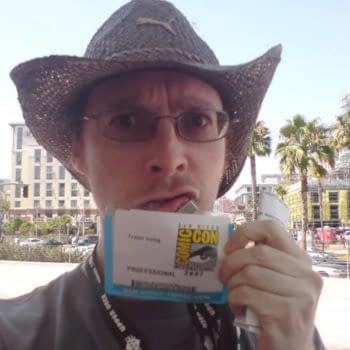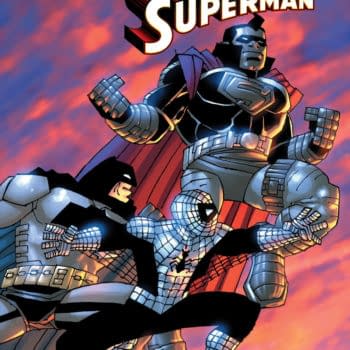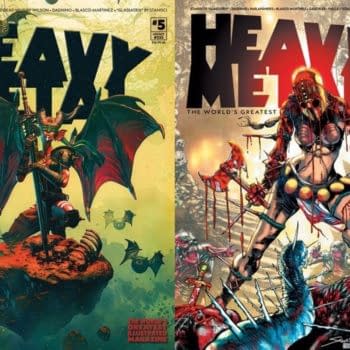Posted in: Comics | Tagged: Comics, dynamite, entertainment, Frank Barbiere, fred van lente, magnus robot fighter, Solar: Man Of The Atom
Magnus Vs. Solar? Well At Least Barbiere Vs. Van Lente
We've seen our share of peer-to-peer interviews but today we have a real fun one. Out in shops today we have Magnus Robot Fighter #3 by Fred Van Lente and Solar: Man Of The Atom #2 by Frank Barbiere. Here we get to see them interview each other. You can see previews of both books here.
Fred Van Lente: Frank, it seems like we live in a much more gendered society than when I grew up, and your opening scene tackles this — I remember playing with my Star Wars and Universal Monster action figures with my sister (Boba Fett and Creature from the Black Lagoon had boss team-ups), but I guess now gender roles are much more rigidly enforced? Or am I just old? What do you think? (If you think I'm old you don't have to say anything.)
Frank J. Barbiere: I think there's been a growing awareness about gender in comics for a while, but it's really become a focus in the last few years—as well in all media! I'm really tired of the term "strong female protagonist," as while that seems like a good idea, it throws female characters into a box where they are expected to be a certain way. I think it's really important to write people like humans, with motivations and desires, and use gender as texture, not a guideline as to how one should act concretely.
FVL: I know you told me you got some on-line flak about making Solar EEUUUYYY GROOOSSSS a woman of the female persuasion. What's the dumbest thing you've seen so far? C'mon, you can tell me. Let's roll around in some Internet muck.
FJB: I've seen a limited amount of people who are just "bummed." I mean, what the hell? This is a whole new character; give us some time to explore her before you decide you dislike her just because she has no penis. Those exact reactions are the problem we face in comics when it comes to gender, and quite frankly if that's a deterrent to reading the book for you I don't want you reading any of my work. Drops mic.
FVL: How did that idea come about, how'd it develop, and what'd it mean to you?
FJB: When I started on book Nate Cosby actually brought it up. We decided we wanted to do a brand new take on Solar as neither of us were particularly well versed and Nate suggested we do something totally different, like change the gender of the character. This sent me spiraling into the idea vortex of making the book about family, about the ways we relate to our parents, and how a power set like this could just nuke the whole thing. It all came together naturally and I think makes for a much more compelling story—and hey, "The Nuclear Family" is just too clever of a pun to waste.
FVL: What's your favorite thing about Erica beyond her transmutation of matter and energy? As a person, I mean?
FJB: She's the opposite of Phil (Seleski, her father and the original Solar) in every way—she's got a rock and roll attitude, she's an artist, a free thinker, and a bit of a potty mouth. The idea of someone like this getting the powers of Solar is much more appealing to me than a stuffy scientist, and the opportunity to show how she'll use the powers differently and what they'll mean to her keeps me very excited with the book. It's definitely a big change of pace, but refreshing—I feel like Erica embodies a much more modern sensibility than Phil.
FVL: What will be a greater danger to Erica in upcoming issues: These mysterious aliens, or her hipster douchebag husband? I don't know, I get a creepy vibe off him.
FJB: Haha, I'm sorry he rubs you the wrong way! We'll definitely be seeing a lot more of Dave—he's a big part of Erica's life and he's been pretty freaked out by the whole chain of events that have transpired. And the stuff with the aliens have just begun! We've got lots of fun stuff we're planting throughout these issues and it's all going to add up to a huge story that readers will constantly be surprised by—I hope.
FVL: Loving the equations and Erica's internal monologue. You know what all those equations mean right? Because that's another thing the Internet won't hesitate letting you know about.
FJB: Actually, I met a gentleman named Christopher Preece (who is thanked in issue 2!) who is a chemistry teacher and helping me out to keep the equations semi-realistic. Clearly they are not a recipe for superpowers, but they are actually relevant and if you look them up are at least in the ballpark of what's going on. It was important for me to have them fit, as I know some readers will question the validity of EVERYTHING if we get even something so simple. Chris recently put together a website about the Science of Superheroes that you all should check out: http://atomicuniverse.org
FVL: What are you most excited for the readers to find out next issue? No spoilers, please…
FJB: I'm most excited for everyone to continue to follow Erica's journey and see just what the hell is going on with Phil. Clearly there is more at play than just him exploding, and let's just say Erica's adventures with her own superpowers are just beginning. Read on, True Believers! I'm sorry—I couldn't help it.
Now let's talk your book and LEEJA CLANE! I know she appeared in the original Magnus story in a different form, but what elements did you add? Was your awesome and fun "theme song" infused/campy TV show stuff an original addition or is this a whole new dimension you thought up?
FVL: Unsurprisingly, given the 60s, Leeja was a pretty straightforward Damsel in Distress from the very beginning in the original Gold Key series. The bounty hunter stuff, the reality TV show, and her sort of view as the human "pro-robot" voice is all unique to this new take.
Whether or not she becomes Magnus's love interest remains to be seen, of course…
FJB: One of the things I've loved about Magnus is how you've managed to infuse some humor in there. As we've discussed, your campy bit with the Leeja show is great (especially your reference to the Bechdel test), but what inspired you to write H8 the way you do?
FVL: Really, I don't know I would have if Nate Cosby wasn't editing the book, who is the biggest hip-hop fan on the planet. H8 was the villain in the original series, and he couldn't stop monologuing about it was pronounced "Hate," so the idea of this archaic 'bot "H8R" speaking in this mangled rap patois would be highly amusing, not just to Nate, but to me and the readers.
That said, though, this isn't just some one-off joke. His existence, and where his arc goes is, well, really it's the central theme of the series. A robot is a representation of the human, and this book is about representation and appropriation. When it's not about karate chopping robots until they explode, of course.
FJB: Cory Smith has been crushing it on this book. I've always been a fan of his stuff, but he's clearly throwing down some career defining work here. Do you find yourself writing bigger action stuff for him now that you've seen what he's capable of? Between the crazy spread in #2 where Magnus takes down the robots and the aerial battle spread here, I don't know what to expect next! What's been your favorite bit so far?
FVL: Oh yeah, after he crushed the Oldboy homage in #2 I just started throwing crazier and crazier stuff at him, and he's just knocking them all out.
I think my favorite is how he does The Swarm, the big bad in #4. Something for us all to look forward to!
FJB: I love the symbol of the Frederick Douglass autobiography and how Magnus clings to it. Again, what was the impetus for this idea? Did it just click when you were writing it and fall into place?
FVL: Yeah, that's the whole theme of appropriation again. H8R is a highly distorted representation of a certain kind of African-American speech; Magnus appropriates Douglass as an ahistorical referent to his own situation.
The key, really, is in what 1A tells Magnus when they're fishing — robots can't be authentic, all they can do is copy. It's nearly impossible for them to come up with anything original on their own.
White people are robots, that's basically what I'm saying. Or is it?
FJB: You and I have talked a lot about how you've spun the robot's "Laws" to fit your take on Magnus a bit more. Can you fill readers in on how you've tweaked them vs. how they were in the 60's Magnus?
FVL: Isaac Asimov came up with the "laws" in his short stories, and the original series kind of appropriated them, without any reference to their originator or any royalties — the kind of thing I don't think we could get away with today, from a legal standpoint. My tweaking of them is to show how different the situation our North Am is from the original — here robots are in charged, and everything is defined for humans by their relationship to machines, as opposed to the other way around.
FVL: Where are you most excited to take Magnus next? I know there's some pretty cool stuff coming up, but what's got you excited about the character and where he's headed?
FJB: If jaws drop at the revelation(s) at the end of #4, I will have done my job and be a happy man.
For more on Solar: Man Of The Atom click here.
For more on Magnus: Robot Fighter click here.
















